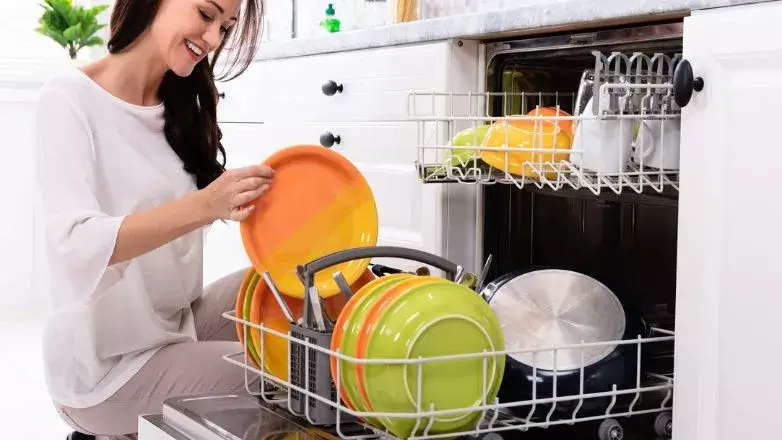A Dishwasher is one kitchen appliance that is exponentially gaining popularity in Indian markets while leaving people amazed over its operation, leading to some essential Dishwashers Reviews FAQs. Certainly, boasting to clean the dishes with 4-5 times less water usage and more hygienically, dishwashers nowadays a turning more of a necessity than a luxury.
However, since the concept of automated Dishwashing is new to people, they tend to develop some queries and doubts i.e. Dishwasher FAQs which normally includes:
- Working of Dishwasher
- Time taken to clean the dishes
- Water usage for cleaning on comparing with manual hand washing
- Are dishwasher better option over manual cleaning
- Should you buy a Dishwasher?
We have compiled 20 most commonly asked Dishwashers Reviews FAQs that would bring in the clarity you need before finalizing to get one for yourself.
Table of Contents
- 1 Dishwashers Reviews India FAQs
- 1.1 1. How do Dishwashers work? or How to use Dishwasher machine?
- 1.2 2. How many items can a Dishwasher hold?
- 1.3 3. Can Dishwasher wash Indian utensils like Kadhai, Tawas?
- 1.4 4. Is there a Correct way to load the Dishwasher?
- 1.5 5. Are there items I should not place in my Dishwasher?
- 1.6 6. How much time does it take to wash the dishes?
- 1.7 7. Do we need to pre-rinse dishes before we put it in the Dishwashers?
- 1.8 8. How much water does a Dishwasher consume compared to hand wash?
- 1.9 9. Do I have to use Dishwasher Detergent Powder, or can I use other types of soap in my Dishwasher? What detergent should I use in the Dishwasher?
- 1.10 10. Do I need to add Salt and Rinse Aid?
- 1.11 11. Does the Dishwasher have to be cleaned after washing the dishes?
- 1.12 12. How Hygienic are the washing results of a Dishwasher, compared to manual washing? Do Dishwashers clean better than by hand?
- 1.13 13. Why isn’t my Dishwasher Draining?
- 1.14 14. How to Get the Best Wash Performance from Dishwasher? How can I improve my Dishwasher performance?
- 1.15 15. How do you clean out a Dishwasher?
- 1.16 16. Is a Smaller version of a Dishwasher available?
- 1.17 17. How does half-load Dishwasher work?
- 1.18 18. Is installing a Dishwasher very difficult and complicated?
- 1.19 19. Will my Electricity bill shoot up after using the Dishwasher? Do Dishwashers use a lot of Electricity?
- 1.20 20. Is it worth Buying a Dishwasher in India? Should you Buy a Dishwasher?
- 2 Conclusion on Dishwashers Reviews India FAQs
Dishwashers Reviews India FAQs
1. How do Dishwashers work? or How to use Dishwasher machine?
Certainly, this is one of the most thought and imagined Dishwasher FAQs people have while hearing about it.
The working of a dishwasher involves 5 major steps:
- Filling
- Washing
- Draining
- Rinsing
- Drying
Dishwashers clean the dirty dishes by spraying water over them. This spraying is done from bottom to top with the help of spray arms that rotate while the water is flushed over dishes. This water is generally hot. In the process, the dishwasher detergent powder mixes with the water to enhance the cleaning process.
After this, the dirty water which collects at the bottom is drained. Meanwhile, the next step after washing comes the rinsing. In order to avoid the formation of water drop marks over the dishes rinse aid is used. Besides, it helps in faster drying out of dishes. Lastly, the drying cycle helps in drying the dishes either naturally or with the help of steam.
A dishwasher consists of multiple in-built cleaning cycles that involve similar steps but with different operating conditions such as raising the water temperature for more hygienic cleaning results.
You can find a detailed working principle of Dishwasher as an answer to this Dishwashers Reviews FAQs here: How Dishwasher Works – Working of a Dishwasher
2. How many items can a Dishwasher hold?
Basically, this Dishwasher FAQs directly connects to understanding the need of a family to select a dishwasher based on its members.
Typically, dishwashers come in 8, 12 & 14 place settings. The place setting is a standard to define the loading limit of the dishwasher. Particularly, one place setting dishwasher machine includes a big dinner plate, a saucer, a coffee cup, a bowl, a small plate, a knife, a drinking glass, a dinner fork, a tiny fork, and two teaspoons.
Basically, an 8 place setting dishwasher is generally the table-top counter type that is suitable for bachelors and 2 people at the max.
Size of Dishwasher in India
A standard 12 place setting dishwasher is most commonly available that suffices the need of a medium-sized family of say 4 members. Whereas, 14 place setting dishwasher is acceptable for larger families having about 5-6 members.
Additionally, dishwashers are smartly designed with baskets & foldable racks and tines that help accommodate a variety of dishes and utensils accordingly.
3. Can Dishwasher wash Indian utensils like Kadhai, Tawas?
All in all, one of the most common Dishwashers Reviews FAQs among Indians before purchasing a dishwasher.
Absolutely yes. The upper and lower basket combination along with foldable racks and tines dishwasher gives ample space to place odd Indian utensils like a pressure cooker, kadhai, Tawa, etc for cleaning.
All in all, glass and steel utensils are best cleaned in dishwashers. Even aluminum wares are better cleaned in the dishwasher. However, when it comes to utensils of cast iron it should be avoided as it may leaded to their easy rusting because of warm temperature conditions inside. Talking about plastic wares, well it would be better to check mention of Dishwasher Safe tags in them before loading them in.
4. Is there a Correct way to load the Dishwasher?
Well, since the architecture of the dishwasher involves spraying water upwards with the spray arms. The better practice is to keep the dishes and utensils facing downside towards the center core, where a direct spray of water is placed on them for efficient cleaning. Prefer placing the ceramic & glassware in the top racks. The bottom basket has ample space with foldable racks to accommodate large utensils with cutlery mounts. The baskets have tines that are foldable so that dishes can be kept upright for optimum cleaning.
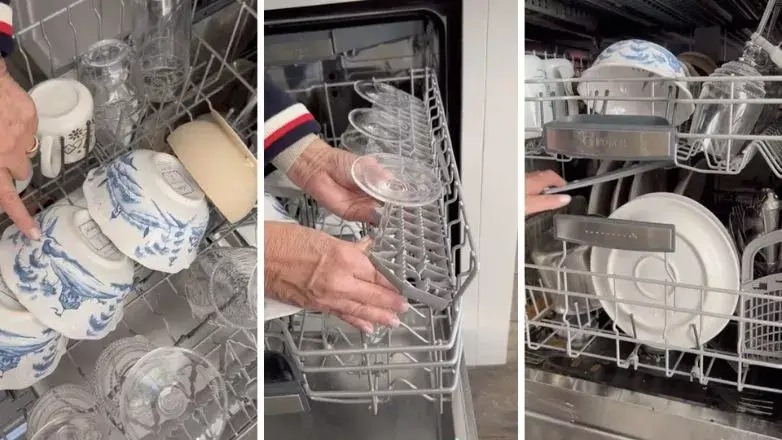
All in all, it’s best to ensure loading in such a manner that optimum cleaning results along with the safety of the utensils are achieved.
Check out this video to better understand about the loading issue of Dishwashers Reviews FAQs:
5. Are there items I should not place in my Dishwasher?
A general analysis says that utensils of cast iron, wood, bone China & certain plastic wares not labeled Dishwasher safe should be avoided. Loading these utensils in the dishwasher would lead to their permanent damage. Even silver wares should be avoided cleaning in the dishwasher as they may get tarnished in the due cleaning process.
Always make a habit to check for the Dishwasher Safe label on the utensils.
6. How much time does it take to wash the dishes?
Basically, with dishwasher boasting to clean dishes automatically, Dishwashers Reviews FAQs regarding wash timings are quite understandable.
Well, depending upon the soiling of the dishes and utensils dishwasher have particular in-built programs that can be selected to get optimum results possible. Generally, a standard dishwasher has Intensive, Economic, Normal & Auto programs in it. These programs operate from a time limit of 30 minutes to more than an hour.
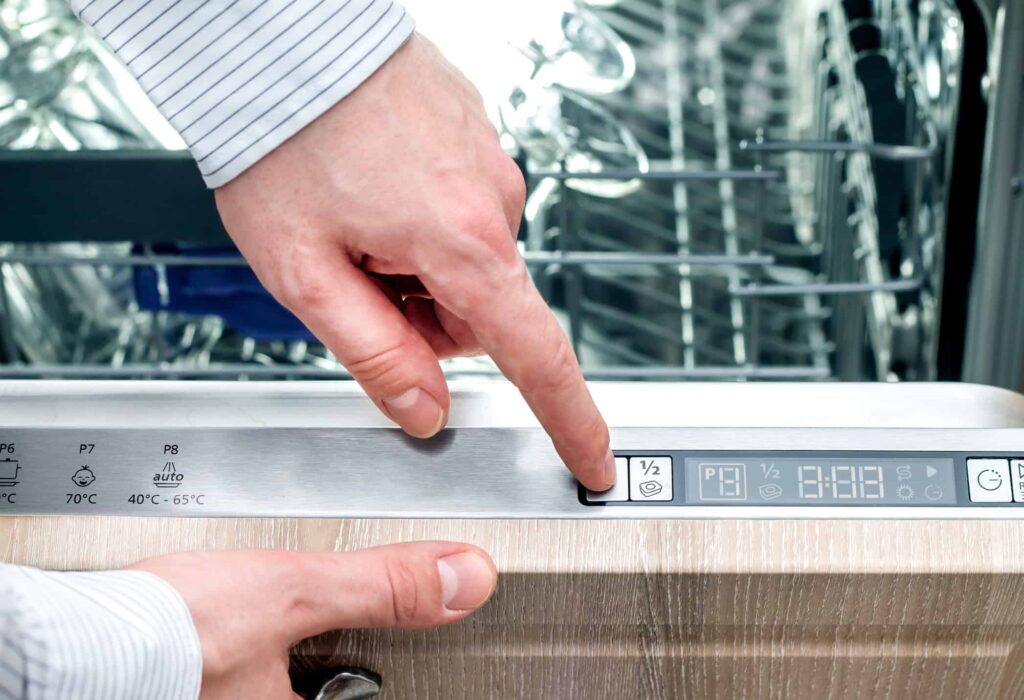
7. Do we need to pre-rinse dishes before we put it in the Dishwashers?
Well, you do not need to pre-rinse the dishes before placing them inside the dishwasher for cleaning. However, it is a better practice to scrape off the leftovers from the dishes, which can later then choke the filters if not taken off. Certainly, most dishwashers have pre-rinse function in-built in them too.
8. How much water does a Dishwasher consume compared to hand wash?
One of the most common argument under Dishwashers Reviews FAQs between automatic & manual cleaning. Typically, while manual washing of utensils and dishes we don’t have an exact estimate of water that is been used. A general survey suggests this figure can reach up to 60 liters.
However, the dishwasher is introduced with the prime purpose to cut down this excessive water usage. Generally, a dishwasher can use up to 8 to 14 liters of water depending upon the loading of utensils and cleaning program selection.
9. Do I have to use Dishwasher Detergent Powder, or can I use other types of soap in my Dishwasher? What detergent should I use in the Dishwasher?
Well, it is strictly said not to use any other hand washing or cleaning detergents in the dishwasher. The problem with them is that they create heavy suds. This may cause the dishwasher to overflow creating much of the mess. All in all, the only dishwasher mentioned detergents ( dishwasher liquid, dishwasher detergent powder, or tablets ) should be used for cleaning of dishes for optimum cleaning results.
Cascade, Finish are some of the most recommended best dishwasher detergent brands in the market.
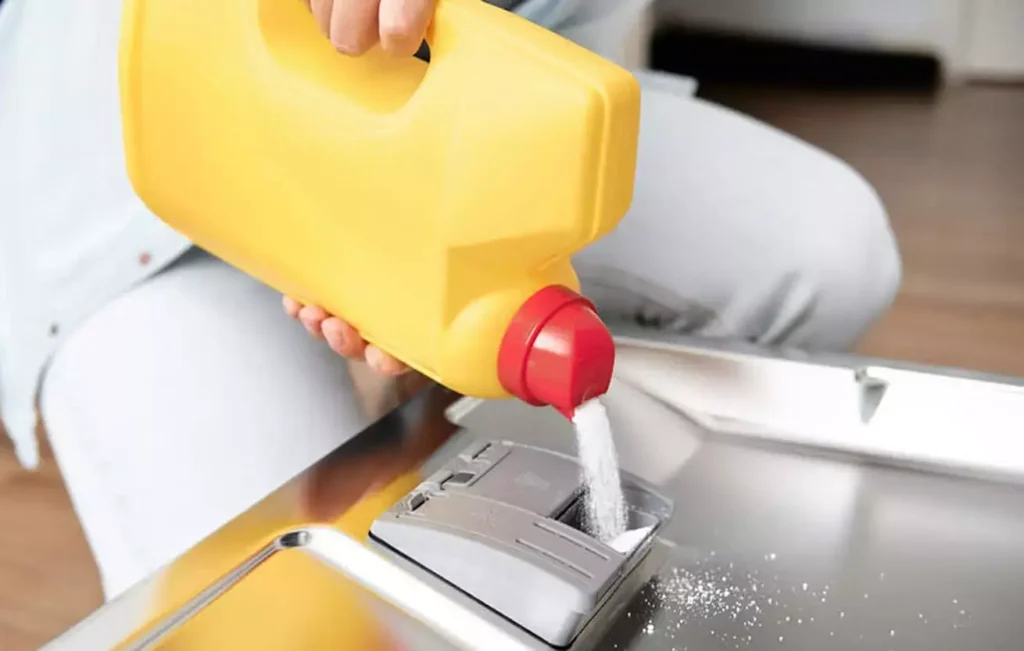
10. Do I need to add Salt and Rinse Aid?
No doubt, these terms like Rinse Aid & Salt often confuse people leading them to develop some relative Dishwashers Reviews FAQS.
Basically, if the water available at your place is hard then it’s better to add dishwasher salt, not regular table salt or dishwasher salt alternative, if your dishwasher doesn’t have a water softening device. This is to enhance the cleaning process and ease of detergent mixing. Else, the internals of dishwasher and utensil surfaces might get scales over them.
Additionally, the Rinse Aid ensures that the surface of the dishes and utensils don’t have any watermark stains over them by helping water spread effortlessly over the surface rather than accumulating. Also, it helps in faster drying of the utensils too.
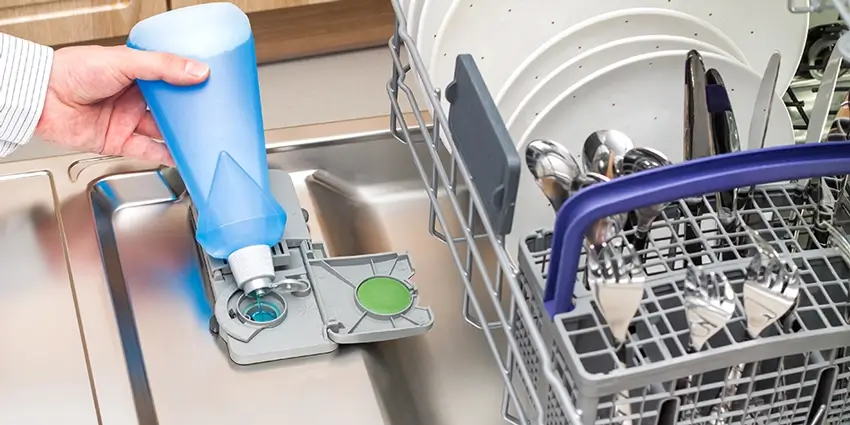
Most dishwashers have salt level & Rinse aid indicator that helps indicate when the salt & rinse aid level drops low and needs a refill.
Additionally, All in 1 dishwasher tablets are available in the market that cuts down the hassle of using detergent, salt & rinse aid separately.
11. Does the Dishwasher have to be cleaned after washing the dishes?
Well, particularly you do not have to clean the dishwasher immediately after it completes the cleaning program. The dirty water gets drained suitably.
However, it is to be due noted that the drain filter and spray arm pores should be cleaned for any choking once in a while so that the water doesn’t get clogged up which might lead to poor cleaning results.
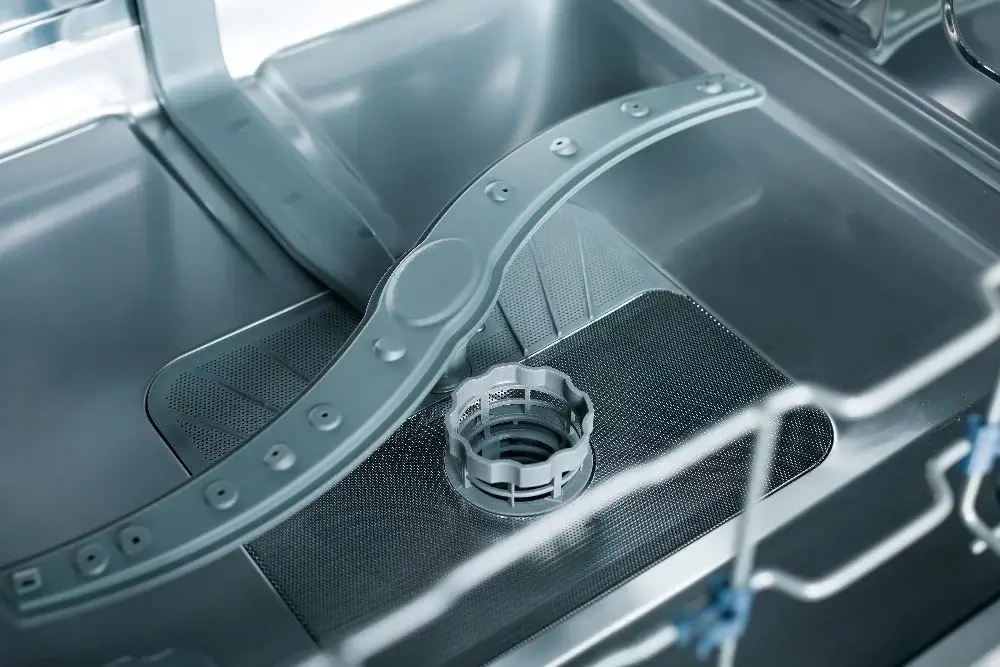
12. How Hygienic are the washing results of a Dishwasher, compared to manual washing? Do Dishwashers clean better than by hand?
To be precise the answer to this Dishwashers Reviews FAQs is Yes, dishwasher cleaning is advantageous over manual hand cleaning of dishes. The reasons to support this includes:
- Firstly, the dishwasher has been established to cut down water usage drastically. While manual washing of dishes you don’t tend to keep an account of water been used and generally end up using about 3 to 4 times higher quantity of water than used in the dishwasher.
- Basically, it’s a misconception that the water spray remains continuous in the cleaning program of the dishwasher, which is not true. Depending on the program the cycle continues for a while till the next process comes up. As a result, the water usage cuts down to a maximum of about 13-17 liters compared to manual cleaning where this could reach up to 60 liters.
- Additionally, dishwashers typically use hot water instead of normal water for cleaning dishes that eventually add up in far better and hygienic cleaning results overall.
- Importantly, it cuts down your hassle and space usage by helping the dishes dry out in its own space rather than being scattered over the tabletop.
- Also, it removes the usage of scrubs and sponges that could act as a breeding ground for bacteria and germs.
13. Why isn’t my Dishwasher Draining?
Undoubtedly, this is one of the most commonly asked Dishwashers Reviews FAQs.
In this case, first check for any blockages at the sump area, by any larger food material that has fallen off the dish and not drained off. make sure you load the dishwasher in a particular manner and scrape off larger food debris before loading them in it.
Next, check for the drain filters. After a particular time of usage, the filter might have got choked and may need proper rinsing or even replacement if needed. You can check the manual to locate the filter and carefully take it out to inspect and clean it on regular periods.
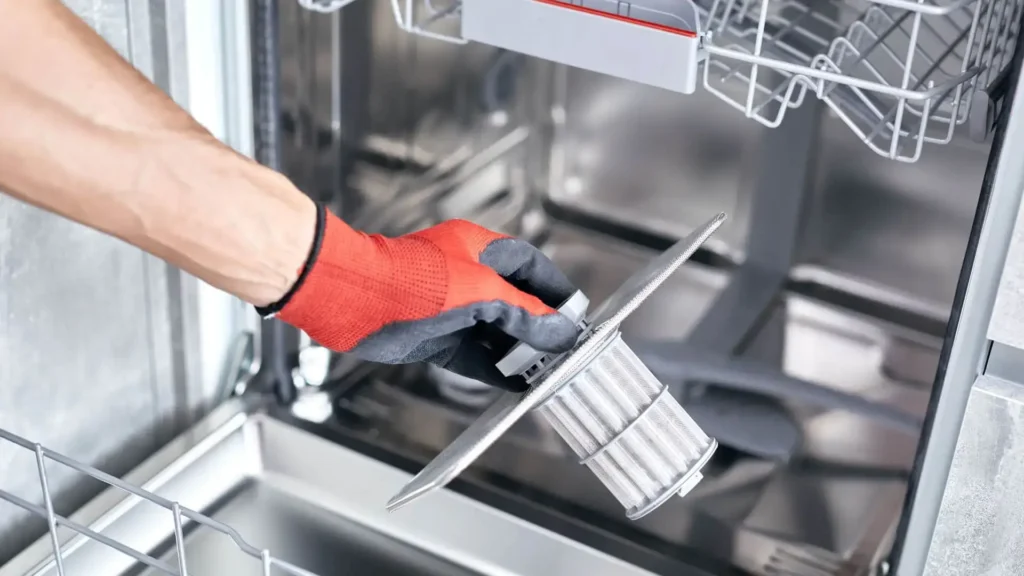
In addition, take a look at the drain connections the hose and drain valves. It might happen some debris may have settle in the drain hose pipe or the pipe may have bend leading to its blockage. Or there might be restriction observed in the movement of the drain valve or the solenoid that operates the valve is malfunctioning. Inspect for the same above and ensure proper solutions needed to clear off the trouble.
Additionally, the dishwasher has a drain pump at the bottom to felicitate the process of draining. A breakdown of pump internal may come in between its smooth operation resulting in clogging. Refer manual to inspect the pump for any damages or ask the customer service to home inspect the situation.
14. How to Get the Best Wash Performance from Dishwasher? How can I improve my Dishwasher performance?
Certainly, this Dishwashers Reviews FAQs is common amongst those who are already using one.
Undeniably, the performance of the dishwasher depends on 4 major aspects which include:
- Proper loading of dishes and utensils in the dishwasher. Keeping them facing down towards the spray arm for direct impact. Cups, glassware, dishes, and saucer to be kept at the upper basket. Larger utensils like pots, bowls, pans, or kadhais to be placed in the bottom basket. Cutlery mount is to be used to load the cutlery with proper spacing. Do not overcrowd the baskets with dishes and utensils.
- Using adequate and dishwasher powder detergent only. Normal detergent wouldn’t bring out the best cleaning result. In fact, they may make the dishwasher to overflow because of high foaming and suds formation.
- Make sure the water heater is healthy so that heated water is available for cleaning. this ensures that the cleaning process helps to kill the germs and the outcome is far more hygienic.
- Do not forget to use salt and rinse aid to avoid any white scale line formation of water droplet remains over the dishes. Helping in faster drying of the dishes.
15. How do you clean out a Dishwasher?
Well, to answer this Dishwashers Reviews FAQs, let us understand that dishwashers are a long term investment that you make. So, proper routine care towards its maintenance and cleaning may help it go long on its performance and durability.
Many DIY suggest using white vinegar (milder one) or lemon juice by placing it in a container on the top basket and running the dishwasher to eliminate greasy oily deposits & hard water or mineral build-up. However, a regular practice of this should be avoided as the acidic nature of the solution may damage the rubber hose pipes in a longer run. It is best suggested to look out for dishwasher cleaner from Finish, Cascade, or Vim as many dishwashers have plastic buttons that may get damage on using acidic cleaners.
On the other hand, to get rid of foul odors and stains in the interior you can spread some baking soda at the bottom of the dishwasher and run a hot water cycle.
Talking about its accessories, periodic inspection, and proper rinsing of filters and spray arms pores is a must to ensure there isn’t any foul water clogging or insufficient water spray available for best cleaning results. You can scrub the spray arm pores with toothbrush or tweezers for any blockages. Filters can be precisely be removed referring to manual and cleaned with hot water, Check for any food debris that has settled along with the corners of the basket or dishwasher internals for scrapping it off manually.
16. Is a Smaller version of a Dishwasher available?
No doubt, dishwashers are made to reduce human hassle for cleaning of the dirty dishes. Be it for bachelors, 2 person family, or a family of 4 to 6 members, dishwasher varying to place setting are available in the market from 8, 12 to 14 place setting.
Generally, bachelors tend to think over this Dishwasher Review India FAQs.
Basically, 8 place settings and table top dishwasher are the small kitchen dishwasher version of that are available for smaller families or bachelors. Besides, it is not required to stack the dishwasher completely, the half load option helps in this case.
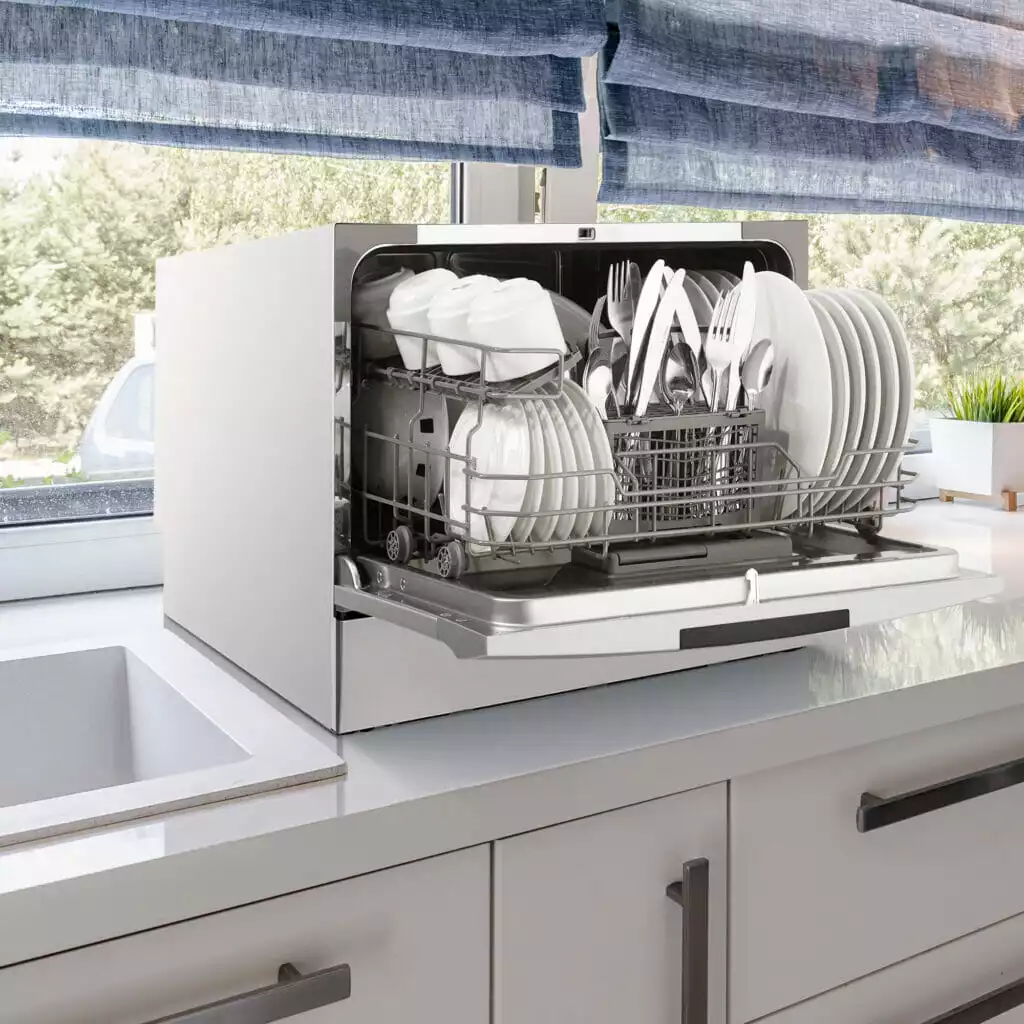
17. How does half-load Dishwasher work?
Although it is best recommended to load the dishwasher completely before starting the washing cycle. However, it may happen that at times complete loading of the dishwasher may not be possible due to the lesser number of dishes.
Well, in this case, half load option comes in handy where you do not have to wait till the dishwasher gets fully loaded. You can either load the upper basket or the lower one depending upon the model for cleaning of the dishes. Particularly, in this only the loaded basket is sprayed with the water be it the upper arm of the lower arm in function. Undoubtedly, this option does help in saving water.
But, a constant check has to be kept, as dishes are prone to bang if not properly accommodated in the basket during half loading. All in all, energy usage during the operation may slightly vary on the lower side compared to fully loaded, but the difference could be less.
18. Is installing a Dishwasher very difficult and complicated?
Well, the installation of a dishwasher isn’t rocket science to start with answering this Dishwasher Review India FAQs.
All in all, it needs an inlet water supply connection and a connection to the drain pipe for removing the dirty water collected after cleaning. Faucets, valves, and hose pipe connections are to be done respectively at internal water source tap and outlet drain line.
Integrated dishwashers are permanent type and the connections to it remain permanent. On the other hand, countertop dishwasher & free-standing portable dishwasher are temporary easy to move type whose connections can be done near to the kitchen sink when required for operation.
19. Will my Electricity bill shoot up after using the Dishwasher? Do Dishwashers use a lot of Electricity?
Certainly, the dishwasher needs power for its working. The heaters installed in the dishwasher for heating the water consume most of the power available. All in all, to precisely answer this Dishwasher Review India FAQs, about 1kW to 2kW is the maximum electricity that a dishwasher ends up using for its operation., depending on its program selection.
20. Is it worth Buying a Dishwasher in India? Should you Buy a Dishwasher?
Without a doubt, dishwashers are taking widely over the Indian markets. Reliable, convenient, easy to use, efficient, and optimum cleaning results all come in to support the cause of buying a dishwasher, all while answering the above Dishwasher Review India FAQs.
With oddly shaped utensils and a high amount of masala, chutney stains over them use dishwashers in Indian kitchen are quite valuable and justified. Many may doubt that ‘dishwasher vs hand washing which cleans better?’, but an efficient modern kitchen dishwasher assures that your hassle cuts down drastically along with water usage as well. Thereby, providing much better and hygienic cleaner results than manual hand washing.
In addition, not only does it save water and efforts for giving optimum cleaning results, but it gives you the time you need for other personal stuff, all while it works for your ease.
So, buying a dishwasher is worth it.
Conclusion on Dishwashers Reviews India FAQs
Altogether, these were the 20 most common and essential Dishwashers Reviews FAQs people have, that needs important attention if you are planning to purchase or already using one for yourself.
In case, you have any other queries on the Dishwasher FAQs, bothering you feel free to drop it in the comment section, we will try addressing it asap.
Read Also: TDS CONTROLLER vs MINERALIZER? – Difference between a TDS Controller and Mineralizer?

